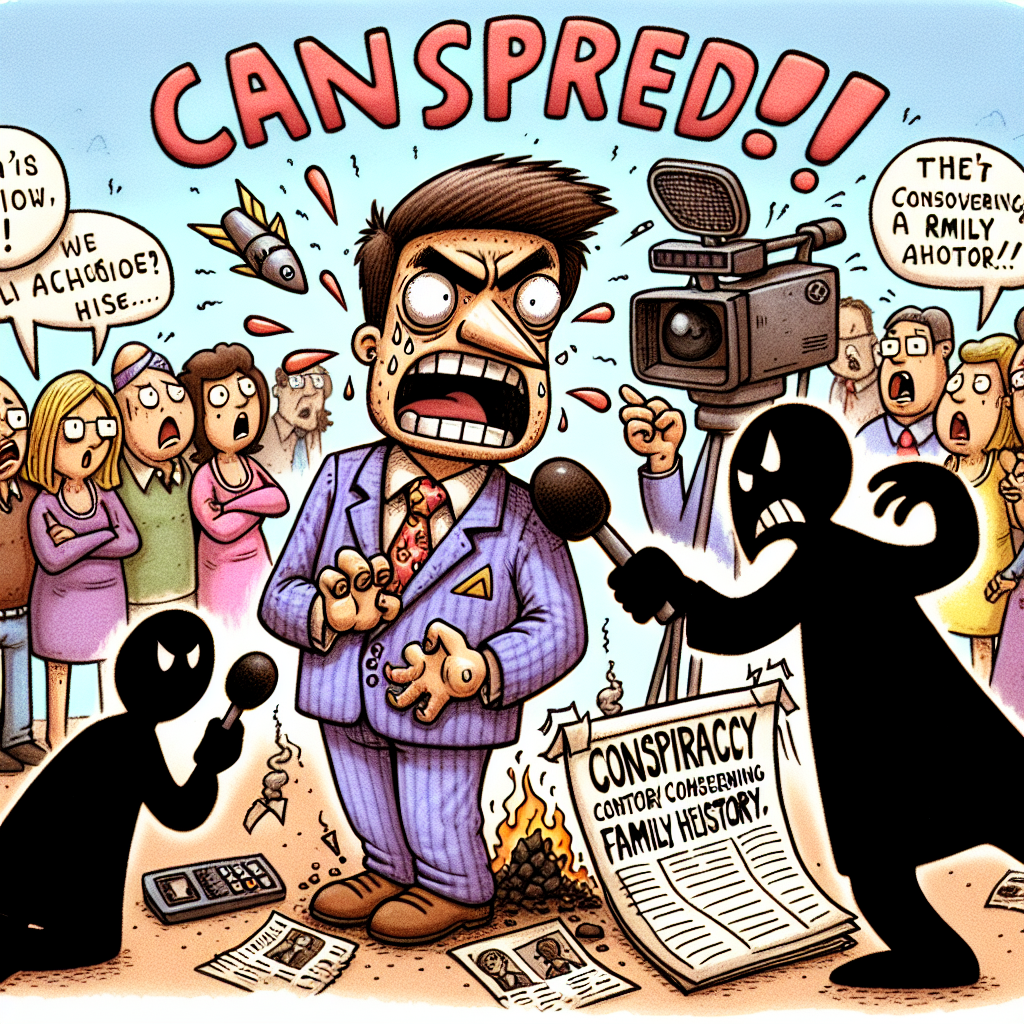Tucker Carlson’s Fiery Reaction to a MAGA Student’s CIA Conspiracy Theory: A Deep Dive into Modern Media Paranoia

There’s a certain delicious irony in watching a prominent media figure lose his composure over a conspiracy theory—especially when that theory ventures into the nebulous realm of covert CIA operations involving family histories and shadowy pasts. Recently, Tucker Carlson’s uncharacteristic fury over a MAGA student resurrecting a chilling conspiracy about his father has splashed across headlines, a spectacle worth unpacking not merely for its drama but for what it reveals about the modern media environment, political tribalism, and our collective obsession with conspiracies.
As an over-researching enthusiast of all things off-kilter, from the questionable radiation emitted by refrigerators to the alleged space-time anomalies hinted at in fringe physics papers (some peer-reviewed, others—well, not exactly), I find this episode emblematic of a larger, more disconcerting trend. The public discourse isn’t just permeated by conspiracy theories; it’s defined by them. The lines between informed criticism, paranoid speculation, and performative outrage have blurred into a kaleidoscope of confusion and mistrust.
The Anatomy of the Tucker Carlson Incident
The incident in question involved a MAGA-aligned student boldly bringing up an alleged CIA conspiracy theory concerning Tucker Carlson’s father. The details are murky, as conspiracy theories tend to be, but the reaction was crystal clear: Carlson became visibly enraged, unable to contain his outrage on-air. This reaction is fascinating on two levels. First, it underscores how deeply personal and volatile conspiracy theories can become when they hit close to home. Second, it exposes a fissure in Carlson’s supposedly unflappable media personality, revealing that even the loudest purveyors of controversy can be rattled by an unexpected assault on their family narrative.
One might wonder why such a fringe theory would provoke such a dramatic response. The answer lies partly in the weaponizing of conspiracy theories by political movements, particularly those that embrace MAGA ideology. These theories function as both rallying points and defensive shields—tools to embolden supporters while simultaneously discrediting detractors. When an insider-level figure like Carlson is targeted with these narratives, it threatens the carefully constructed persona he projects. The resulting meltdown isn’t just about the theory’s factual basis; it’s about the emotional and psychological stakes entwined with personal identity and political allegiance.
Why Do We Cling to Conspiracies?
To understand the cultural thermometer that reads Mr. Carlson’s response so sharply, we have to consider why conspiracy theories thrive in the first place. Humans are wired for pattern recognition, especially when the patterns are frightening or seemingly inexplicable. In times of uncertainty, conspiracy theories offer a semblance of order and a villain to hate—it’s an emotionally satisfying narrative arc, however irrational.
Moreover, the modern media environment exacerbates this tendency. The 24-hour news cycle, social media echo chambers, and the endless supply of user-generated content create a fertile ground for misinformation to fester. When a conspiracy theory about a mainstream figure’s family starts circulating, it doesn’t just challenge facts; it challenges an entire worldview.
In Carlson’s case, the conspiracy about his father’s CIA connections taps into deep-seated anxieties about government surveillance, shadow governments, and hidden powers manipulating public consciousness. Whether or not there’s any smoke to this fire is beside the point—the theory’s utility lies in provoking doubt and fueling outrage.
The Blurred Line Between Critique and Paranoia
One of the more worrying consequences of this incident—and countless others like it—is how the distinction between legitimate political critique and paranoid delusion is eroding. It’s not merely that conspiracy theories are gaining ground; it’s that their emotional and rhetorical power has begun to supersede evidence-based discourse.
This is not to dismiss all skeptical inquiry or to undermine all questioning of authority. Healthy skepticism is the foundation of science and democracy. Yet, when suspicion mutates into unchecked paranoia—backed by dubious “evidence” such as a misinterpreted document, a shaky timeline, or an anonymous whisper—the result is a toxic feedback loop. Media personalities, politicians, and their audiences feed this loop, creating a theater of outrage where facts matter less than the drama of accusation.
I recall, oddly enough, a paper I stumbled upon in an obscure journal on “Electromagnetic Influences on Cognitive Bias” (Johns & Feldstein, 2017) that hypothesized environmental factors like RF emissions from common devices could unpredictably influence human perception over time. While the citation is highly contentious and certainly not mainstream, it speaks metaphorically to how our environment—in this case, the digital echo chambers and sensationalist media—warps our collective reasoning.
What This Means for the Public Sphere
The Carlson episode is a microcosm of a society in peril of being hijacked by the allure of conspiracy. It’s a symptom of an information ecosystem where verification is optional and outrage is currency. Trust in institutions—from government to media—is declining, and in its place grows a gnawing suspicion fueled by half-truths and more than a little paranoia.
Unfortunately, the proliferation of conspiracies also serves political agendas that benefit from confusion and division. When significant figures can be equally victims and perpetrators of conspiracy narratives, the underlying political movement (here, the broader MAGA coalition and its media apparatus) thrives on a feedback cycle of loyalty and victimhood.
The question we should be asking is: How can a society function when its pillars—trust, truth, and civility—are eroded by conspiracy theories wielded like weapons? How do we cultivate a political culture where legitimate grievances can be voiced without exploding into wild, unfounded accusations?
Final Thoughts: Beyond Rage and Paranoia
Tucker Carlson’s furious reaction to a student reviving a CIA conspiracy isn’t just a moment of personal offense; it’s reflective of a much larger cultural and political malaise. The ease with which conspiracy theories slip into mainstream conversations, especially through the megaphone of partisan media, erodes our capacity for nuanced debate and mutual understanding.
As the public, the onus lies on all of us—to be vigilant, skeptical, and above all, committed to truth rather than spectacle. While it may be tempting to dive into the abyss of wild theories, sometimes the most radical act is to demand boundaries: between fact and fiction, skepticism and paranoia, outrage and reason.
In the end, our society’s health depends on reclaiming these boundaries before they dissolve entirely into chaos.

